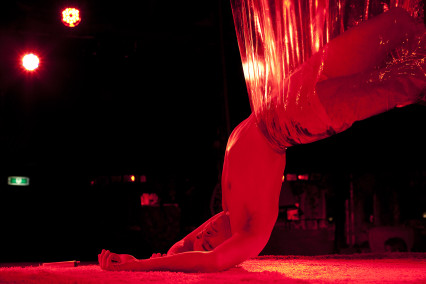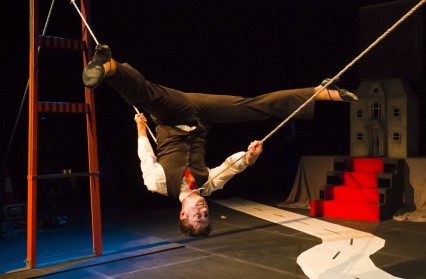Mary Bijou Cabaret, Riverfront Theatre, Newport
The cinematic legacy of Alfred Hitchcock continues to grow three decades beyond his death, so that in a Sight and Sound poll of 2012 a distinguished panel of international film directors and critics selected his 1958 masterpiece Vertigo as the greatest film of all time. Hitchcock’s enduring power derives from the potent blend of slick entertainment, sexual fascination and paranoid unease that suffuse all his films. Mary Bijou Cabaret’s touring production of Hitch – an affectionate celebration of the work of the great master of suspense – scores very highly in terms of entertainment, with its heady concoction of circus skills, camp humour and theatrical spectacle, however, it lacks the nail-biting tension and dark Freudian explorations that might have given the show a truly Hitchcockian edge.
Hitch is comprised of a series of sketches and routines that draw on classic thrillers such as Rebecca, Suspicion and North By Northwest for their visual and thematic inspiration. Proceedings are ring-mastered by George Orange, who fizzes with an infectious enthusiasm for the work of Hitchcock and a nervy comic energy that is endearing. Yet while the costumes evoke the glamour of Edith Head’s designs, and the on-stage musical accompaniment quotes the imperishable scores of Bernard Herrman, the nagging feeling remains that Hitch merely scratches the surface of one of cinema’s most complex and ambiguous artists.

An early scene in which Orange, playing the eponymous corpse Harry (from The Trouble with Harry) is twisted like the proverbial pretzel by two women trying to dispose of the body. Much humour is wrought from the performer’s contortions, very much in keeping with the black humour of its source material. Such comedy seems misplaced in a later scene that burlesques Rear Window, which surely offered scope for a more interesting theatrical exploration on its themes of voyeurism and obsession.
One stand-out moment in the show comes in a startling coup de theatre that provides a good indication of what Hitch might have been, had its makers fought their instincts to go for a good gag occasionally and ventured into the murkier psychological waters of Hitchcock’s psyche. In this disturbing and provocative scene, a young actor comes to Hollywood in search of fame and success. He lip-synchs to actress Kim Novak, recalling in an interview years later, how she was modelled by Hitchcock’s obsession with her physical appearance, especially her blond hair, in meticulous detail. The actor is stripped of his fifties style suit down to his underwear, and then cross-dressed as the image of the archetypal Hitchcock blonde. It is a startling depiction of the transforming process, redolent with sexual ambiguity and modes of directorial control. The sinister atmosphere is quickly dispersed by a dance routine by three men in drag set to ‘Pleasant Valley Sunday’ by The Monkees. But this joke wears thin in seconds as the song satirises small-town America in an obvious and anodyne manner that lacks Hitchcock’s mordant wit.
The second half of Hitch is a similar confusion of the sublime and the ridiculous that does not cohere into an entirely satisfying production. A powerful recreation of the notorious shower scene from Psycho, staged rather miraculously inside a massive plastic-bag suspended above the stage, follows a recreation of The Lady Vanishes with the help of volunteers dragooned from the audience. The audience participation is rather well-handled and gets big laughs – no one could accuse the combined efforts of the hard-working Mary Bijou performers of being anything less than good-hearted enjoyable fun. Yet if you are going to devise a show inspired by the work of Alfred Hitchcock, it is surely not enough to merely quote and reference his works in the manner of a dedicated movie buff. The great director was always able to entertain and disturb simultaneously, and there is little to disturb in Hitch, nothing lingers. Hitchcock once said his aim was to give his audiences ‘the same pleasure they have when they wake up from a nightmare’. Mary Bijou Cabaret effortlessly combine comedy with physical daring, but that curious pleasure of psychological release from terror was crucially lacking from Hitch because its makers lacked enough daring to confront our innermost fears.
Photo credit: Tom Beardshaw












